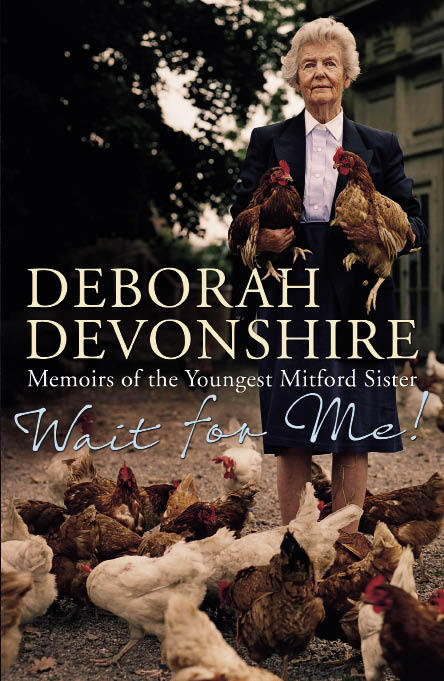Because Deborah Devonshire’s journalism has nearly always made me laugh, and because she seems like one of the jollier aunts in P. G. Wodehouse — an Aunt Dahlia, not an Aunt Agatha — I had expected her memoirs to provide chuckles on every page.
Because Deborah Devonshire’s journalism has nearly always made me laugh, and because she seems like one of the jollier aunts in P. G. Wodehouse — an Aunt Dahlia, not an Aunt Agatha — I had expected her memoirs to provide chuckles on every page. In fact it is a sad book, taken all in all. Two of the more poignant passages, which will linger in my memory for a very long time, are about her dead babies, and about the alcoholism of her magnificent husband, the 11th Duke of Devonshire.
Mark, Victor and Mary, the babies, lived, respectively, five hours, seven hours and four hours. Only recently was their mother told, by the vicar’s widow at Edensor, the village next to Chatsworth, that the infants were all baptised by ‘Moucher’, the author’s mother-in-law and wife of the 10th Duke.
The three pages devoted to the 11th Duke’s alcoholism, and the ‘tough love’ cure which was imposed upon him — Debo and guests leaving the house; Andrew Devonshire ringing her up and pleading with her to return, and her doing so only on condition that he gave up the booze — are in their way equally moving. She does not flinch from describing the nightmare which his alcoholism caused everyone who had to do with him; but nor does she fail to pay tribute to his very great qualities. I only met him after he had given up the drink and would say without hesitation that he was one of the most exemplary human beings I ever knew — funny, kind, extremely clever, modest and like most interesting people always slightly tormented.
On another page of the book, she writes:
Recently a young journalist came to interview me about what I was doing the day war broke out. During the course of the interview, I recounted the deaths of my only brother, Andrew’s only brother, a brother-in-law and my four best friends. ‘So’, she said, ‘did the war affect you in any way?
This was not to mention — as she does a few pages previously — the grisly task of going to Switzerland at the beginning of the war to bring home Unity, her sister who had shot herself in the head when war broke out between her beloved Führer and her native land. When they came home, Unity was incontinent, so ‘Muv’ had to wash sheets every day. Unity hated Debo and verbally abused her all the time.
So this is hardly a jolly read, even though there are of course plenty of laughs. For instance, the bus conductor on the north London route shouting out, ‘Holloway Jail. Lady Mosley’s suite. All change here’ (Debo’s sister Diana was imprisoned for the duration under the 18B Regulations). And, for ‘Uncle Matthew’ addicts, there are many good anecdotes about Farve. I liked the story of his taking the family to Paris, while Swinbrook House was being completed for occupation, and being whistled at by a policeman because he was driving on the wrong side of the road. He rolled down the window and said to the gendarme:
‘Sorrry, no Frrrench’ — in an exaggerated French accent (to make it easier for the policeman to understand).
Every time the vague oldest sister, Pamela (‘Woman’), appears, the reader lets out a cheer because a good story is going to come. I especially liked her being placed next to Lord Mountbatten at a dinner party given for the wedding of the present duke (‘Stoker’).
‘I believe you are called Woman by your family.’
‘Yes I am. And may I ask who you are?’
All the childhood parts of the book are excellent. The characters who have become familiar to us, from Nancy’s novels and Jessica’s hilarious if unreliable memoir, Hons and Rebels, all reappear, but seen in a subtler and gentler light. Unlike many of her siblings, Debo actually loved her parents unreservedly, and the descriptions of the break-up of the marriage, and Farve’s besotted devotion to his housekeeper, Margaret Wright, are, again, very sad.
In one of the childhood chapters, the author speaks of sharing a bedroom with her sister Jessica. ‘We chatted for half the night . . . what about, heaven knows, but no secrets were hid.’
The reader is not in the same lucky position as Jessica Mitford. This is a book where many secrets are hid. For my vulgar tastes, the extreme discretion seems pointless. I shall not be alone in wanting more about Lucian Freud, more about President Kennedy and more about the Prince of Wales. I do not mean she should spill the beans about love affairs, if she has had them, or break the protocol about repeating conversations with the royal family. But, for instance, she once told me an entirely harmless, but very funny story about Senator Edward Kennedy’s last visit to Chatsworth. Here we are simply told that the Senator’s arrival coincided with ‘a visit of the Prince of Wales’. I implore her to tell the full story when — as will surely happen — the book sees many reprints.






Comments